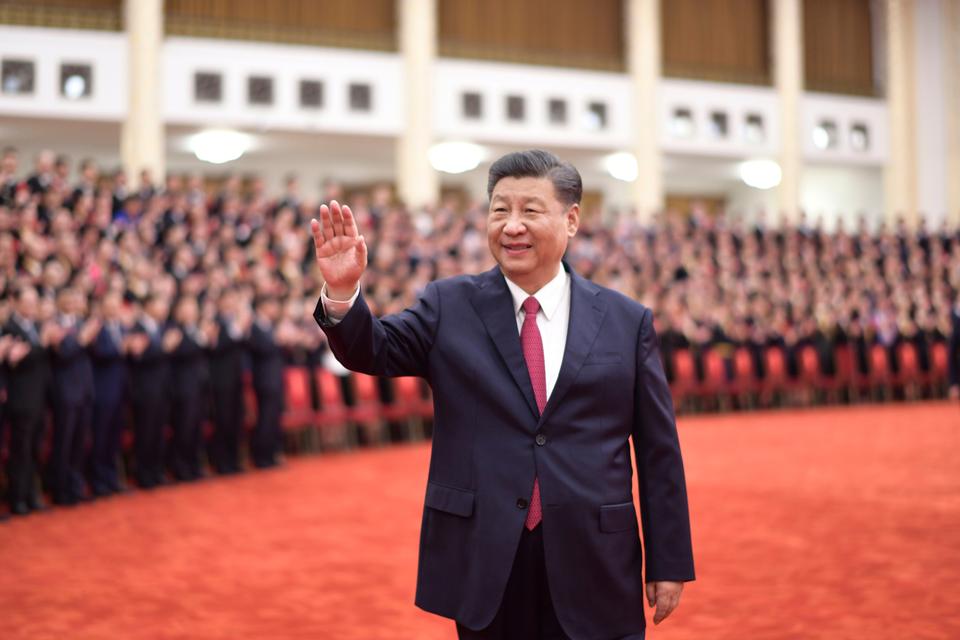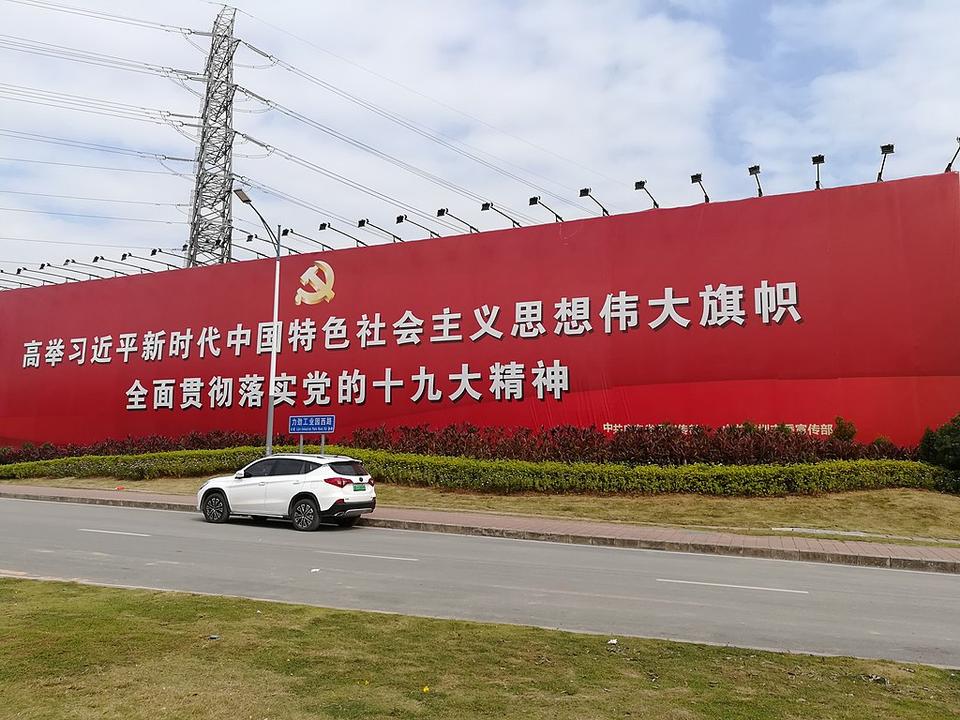what does it mean to be communist in china
Beijing's 21st century Marxism does not see an intrinsic contradiction within its organization, equally long as it fits inside how China has been ruled for thousands of years.
This year marks the founding of China's ruling Communist Party's centennial, a period Beijing defined as a "glorious journey" in its latest Central Committee meeting in Nov.
In July 1921, the first Congress of the Chinese Communist Party was held with 12 or thirteen people in attendance, including Mao Zedong who after became the country'south 'lifelong leader'. Participants of the Shanghai meeting could not even recollect the exact day. Only today the aforementioned party has millions of members, continuing to chart China's destiny.
While Russia'southward communist experiment, the Soviet Spousal relationship, failed miserably in 1991 aslope many other socialist states in Eastern Europe, Red china still considers itself a communist state, running a form of a capitalist system, which has allowed information technology to become the globe's second largest economy.
Then how does this hybrid system piece of work in Cathay?
Charlie Parton, a prominent adept on China and a senior acquaintance swain at Royal United states of america Constitute (RUSI), a British think-tank, argues that the system works thanks to Mainland china's estimation of Marxism and the Communist Political party'southward overemphasis on "historical continuity".
"The endeavors of the Political party and the people over the past century represent the well-nigh magnificent chapter in the millennia-long history of the Chinese nation," said the latest resolution of the Central Commission of Chinese Communist Party (CCP), establishing a articulate connexion betwixt the country's history and communism.
This crucial connexion has been recently defined as "socialism with Chinese characteristics" by the country's leader, Xi Jinping, which claims to explicate both the Chinese Communist Political party'south exceptional character tied to the country's long history and its future conduct. Since the late 2010s, information technology's also been called Xi Jinping Idea.

"Information technology would not say that information technology was capitalist comport, but a manifestation of socialism with Chinese characteristics. You might say that that is a piffling disingenuous. Simply existence disingenuous has never bothered the CCP," Parton, who was also the EU's sometime First Councillor on China, tells TRT Globe.
"The ability to hold a contradiction in listen without discomfort is something which is difficult for the Due west, which has been brought up in the Aristotelian school of logic. The Chinese discover it less distressing," the sometime pinnacle diplomat says. Dissimilar Russians, whose religious and cultural life appears to have various similarities to Europe, the Chinese experience much less attachment to Greek philosophy.
Just for the CCP, it's "a new breakthrough in adapting Marxism to the Chinese context."
Chinese exceptionalism
In the past, the Soviets or other communist states and movements were near e'er proud of having a universal communism, which could apply to anybody in every land, claiming that universalism signalled the eventual victory of Marxism around the globe.
Every bit a consequence, the Soviets, which ruled not simply a large Russian speaking people but also various non-Russian speaking people like Cardinal Asian Turkic nations, never claimed to accept such a socialism with Russian characteristics. That might also partly explain why the Soviet arrangement collapsed in the face up of modern capitalism and Chinese socialism survived.
Also, in that location is one significant difference between the two communist experiments. In the late 1980s, when the Berlin Wall barbarous, the Soviet leaders thought that they needed to change non merely the economical construction merely besides the political system, dismantling the ruling Communist Political party.
Only the Chinese thought differently, believing that the CCP was adept, but the economical organization needed to be changed. As a result, they integrated capitalist elements into their political economy to conform to the new reality of the 1990s.
"China accelerated its astonishing development process of the last 50 years by sometimes defining its system of governance as 'socialism with Chinese characteristics,' which was a coded mode of expressing its participation at home and internationally in the backer world economy guided by a perspective usually described as 'neoliberal globalisation'," says Richard Falk, a leading skillful on international relations.
"Such an identity was underscored by Chinese membership in the World Trade Organization (WTO), widely accustomed as an institutional body entrusted with overseeing and promoting neoliberalism. Information technology is common for economists to describe Red china after the policy reforms associated with Deng Xiaoping in 1991 as a 'socialist market economic system'," Falk tells TRT World.
While the CCP uses various authoritarian measures to control the globe'south largest population, its survival cannot merely exist explained by authoritarianism as it has unremarkably been portrayed in the Western world, co-ordinate to Falk.
In contrast to that approach, the CCP's success mainly lies in its "remarkable record of administrative competence" inside Chinese borders as Beijing also conducts a foreign policy relying "on soft power approaches, producing many win/win solutions" like the hyper-ambitious Belt and Road Project, the professor says.
Both the internal and external comport of the CCP is clearly different from the Soviet model, whose corrupt bureaucracy and adventurist military endeavors made things worse for the state in the long-run, leading to its collapse.
"In the last two decades, China has overseen the greatest economic and geopolitical ascent in history, measured by spectacular growth, alleviation of extreme poverty, and increasing authorisation of the most pregnant technological frontiers of 21st century innovation," Falk says.
Interestingly, while many Westerners see this phenomenal Chinese development equally the success of their capitalist model, in Beijing, the political understanding is completely different, believing that information technology's the wonders of their own interpretation of communism.

The 21st Century Marxism
Xi, who is besides the head of the CCP, is cardinal to understanding 21st Century Marxism. To the Chinese, Xi embodies a leadership pretty much similar what Mao symbolised back in the day, then he is the electric current representative of Maoism.
"'21st Century Marxism' is used as a way to place and highlight the relevance of the idea of 11 Jinping, and elevate to a status equal to Mao Zedong," says Falk.
As a result, on a doctrinal level, Xi Thought is the continuation of Mao Zedong Thought, according to the CCP. Many expect that the CCP will sanctify Xi Thought every bit its nigh updated official doctrine at the side by side twelvemonth'due south 20th political party congress.
"In ideological discourse Xi prefers to stress the socialist nature of the Chinese arroyo rather than to claim its 'Communist character.' Xi also wants his audience to take the idea that Marxist idea is dynamic and remains in this century 'total of vitality'," the professor maintains.
Xi'south 21st Century Marxism also somewhat shows the nascent state of the CCP, which has not still achieved communism as Karl Marx theorised it in the 19th century. "In theory it is still on the route to that blest state. For the moment it is going through the stage of socialism," says Parton, the British diplomat.
"Marx and Engels' analysis of the basic contradictions in capitalist gild is non outdated, nor is the historical materialist view that capitalism is spring to die out and socialism is jump to win," said Xi.
Merely many Westerners believe that all these doctrinal titles and words are used to encompass Mainland china's disciplinarian capitalist nature. "The Chinese Communist Party remains the land'southward ultimate authority, so 'communist' must remain in the country's proper name to maintain the legitimacy of the party'south claim to supreme power," says Matthew Bryza, a sometime United states of america diplomat to Azerbaijan, a sometime Soviet republic.
"As with all communist parties, over time, greed and cocky-interest eventually became more important to the Chinese Communist Party's leadership than ideology," Bryza tells TRT World.
Despite his criticism of the CCP, Bryza still sees Xi every bit a genuine believer in Marxism. "Eleven Jinping seems to be trying to change that and pull the country a flake back from commercialism and more toward the egalitarian ideology of communism," he says.
"Squaring this circle is one of 11's greatest challenges."
Source: TRT Globe
adamswoustravight.blogspot.com
Source: https://www.trtworld.com/magazine/why-china-continues-to-call-itself-a-communist-state-52947
0 Response to "what does it mean to be communist in china"
Post a Comment